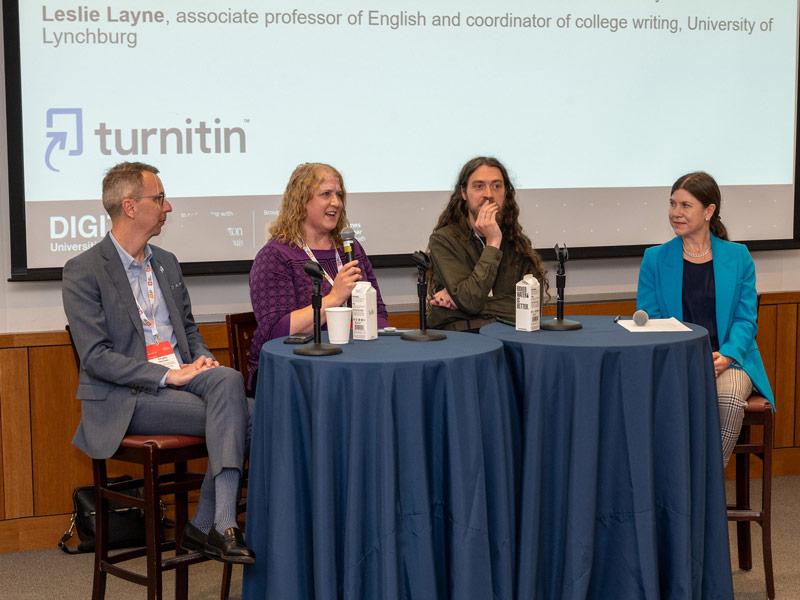This response to generative AI will likely see an overhaul of assessments, according to panellists at a session held during the 2024 THE Digital Universities US event, in partnership with Turnitin.
“I don’t want my job to be AI detection forever. We’re past that,” said David Adamson, distinguished machine learning scientist at Turnitin. Instead, Adamson advocates the integration of generative AI in education.
Because generative AI allows a student or instructor to speed up the writing or assessment process, the end product is easy to achieve with the use of AI tools. Adamson said that this means technology providers and educators need to decide what they want to assess about students’ learning.
This has been a conversation among educators for decades, Adamson said, but now AI has forced the sector to think more carefully about what skills it’s trying to assess. “Now we have to really pay attention and engage with our students in the [learning] process while getting the speed benefits we can at assessment… without releasing everything to the assistive tools,” he said.
Douglas Harrison, associate dean of the Division of Applied Undergraduate Studies at New York University, welcomes this change and said it should help students to understand why they are carrying out the tasks asked of them. He said that essay writing cultivates real practical and transferable skills – but that’s not always obvious to students. “If we don’t invite them to understand how you can translate these skills to different contexts, then they are going to be much more likely to just [use] an AI tool. We presume it has value and we submit students to these arbitrary regimes of academic discipline and punish them, as opposed to inviting them into a process,” he said.
While some educators have resisted integrating AI into their teaching, others have embraced it. Leslie Layne, associate professor of English and coordinator of college writing at the University of Lynchburg, redesigned her class as soon as ChatGPT arrived and has integrated it now for three semesters.
The idea of learning along with the students was celebrated by the panel. “I’m having students put things into it and find out what it’s good at and what it’s bad at. Students are very quick to figure that out,” Layne said.
Layne suggests that institutions adopting AI tools should take a step-by-step approach. “We’re all learning at the same time,” agreed Harrison. “You can build a more mature capacity for experimentation and integration. We’re all co-constructing this with our students.” Transparency is important in this process, especially while assessment design is in flux.
Layne said that while previous academic integrity technology could produce side-by-side results for the likes of plagiarism, AI use is far harder to manage. But instead of penalising students who use such tools, AI detection can be used to start a conversation about why they didn’t trust their own voice for a particular answer. Adamson added that while Turnitin could create a panopticon that measures every keystroke to replace its AI detector, that is not what it wants to do.
Harrison concluded that the responsibility is on educators to articulate not just what is expected but why. “If you want less cheating, teach better,” he added.
The panel:
- David Adamson, distinguished machine learning scientist at Turnitin
- Eliza Compton, content curator, THE Campus (moderator)
- Douglas Harrison, associate dean, Division of Applied Undergraduate Studies, New York University
- Leslie Layne, associate professor of English and coordinator of college writing, University of Lynchburg
Find out more about Turnitin.


comment